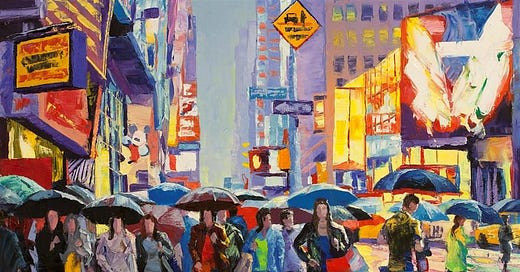Wait! Just Listen is a weekly Sunday newsletter on living a purposeful and meaningful life, in a digitised world of opinion polarisation, gratuitous commentary and click-bait. Subscribe with one-click to receive my musings right in your inbox. If you want the premium experience, feel free to opt for the paid option for longer form content and additional audio materials on my writing process.
The cult of productivity is well and truly alive. We’re mining every last frontier of sanity and stillness for the tiniest nugget of precious efficiency. I blame this on the culture of metrification that we’ve grown accustomed to; there is an optimal number for literally everything.
But this isn’t surprising.
Most of our milestones in life seemed to be prefaced with quantitative benchmarks. It begins at the point of conception, where millions of viable sperm are locked in a maddening race towards a single chosen egg cell, or maybe more depending on mother nature’s generosity. A ‘survival of the fittest’ narrative takes centre stage potentially leading to the chance-event of a particular configuration of atoms - the first signs of life.
Then after nine months, or thereabouts, the next thrilling and yet beautifully haunting chapter ensues. This ethereal combination of atoms emerges as a fully-formed subjective being.
After a battery of routine tests and measurements, parents are duly presented with their creation replete with a booklet of development milestones and statistics.
And just like that the baptism by numbers is complete and the new-born is thrust into a world fuelled by the insanity of productivity. The same meticulous level of efficiency and exactitude demanded during fertilisation is now exteriorised as a full-blown devotion towards creating more with less.
We’re all caught up in this hamster wheel of productivity - the more we churn, the greater the return, or so we think. We struggle to tear ourselves away from this mindset, because like in all toxic relationships, there are complex and conflicted reasons behind why we stay and grind away. But my critical appraisal of productivity isn’t so much on its cost to humanity (of which there are many), but rather in how true purpose and meaning (not the superficial zen-like affirmations on Instagram) have become aspirational rather than simply accessible. They have, in an almost bewilderingly ironic twist, become luxuries that fall upon the laps of the fortunate few. Why is this so?
The answer is disarmingly simple. We’ve developed our lives and livelihoods on the premise of distraction, with productivity being its chief instigator. The notion of productivity - one’s measure of efficiency - is driven by the habitual compulsion to ensure that the next moment contains what this one lacks. We trample on the richness of the present moment to secure the fruits of unlived and unrealised future moments. Productivity then, for the most part, becomes a never-ending cycle of addressing the problem of scarcity - the idea that time needs filling.
Roman philosopher Seneca’s spellbinding 2,000-year-old treatise On the Shortness of Life— provides the most relevant analysis of humanities vulgar obsession with maximising output. It is a book of extraordinary prescience and warm wisdom.
Seneca writes:
Everyone hustles his life along, and is troubled by a longing for the future and weariness of the present. But the man who … organizes every day as though it were his last, neither longs for nor fears the next day… Nothing can be taken from this life, and you can only add to it as if giving to a man who is already full and satisfied food which he does not want but can hold. So you must not think a man has lived long because he has white hair and wrinkles: he has not lived long, just existed long. For suppose you should think that a man had had a long voyage who had been caught in a raging storm as he left harbor, and carried hither and thither and driven round and round in a circle by the rage of opposing winds? He did not have a long voyage, just a long tossing about.
The ‘hustle’ culture Seneca references has continued into the 21st century with lifestyles of busyness and hard work earning a certain social legitimacy; a badge of honour that renders you as a productive member of society. But underlying these ‘life decorations’ lies a more harrowing truth. In our relentless pursuit of maximisation, we are ceaselessly toiling away for the goals set by another. The corporation. The state. The law. The economy. Entities that call you to themselves but draw you away from yourself.
Productivity, as virtuous as it is, has muted our instinct and ability to learn how to inhabit our own selves fully in this brief and transient spell of existence, which is where meaning and purpose reside. True purpose isn’t solely within the purview of the morally well heeled and privileged, but rather, it is granted to those who are brave enough to stand stoutly in the current moment, absorbing every ounce of its beauty, fragility and impermanence. It is this experience of sacred vulnerability - a surrender of sorts to the present moment - that fills life with the richness it deserves beyond the burden of expectations and needless quantification. The present moment doesn’t need the validation of likes or shares, it thrives just by being itself, raw and unadulterated.
It is time to break our busy gait on the hamster wheel and start living.





Wonderful reminders. I just read a long essay on research into -- ugh -- how to infuse our dreams with advertising and it's just like so much more draining our lives in the service of someone else's profit.
Love this: "So you must not think a man has lived long because he has white hair and wrinkles: he has not lived long, just existed long."